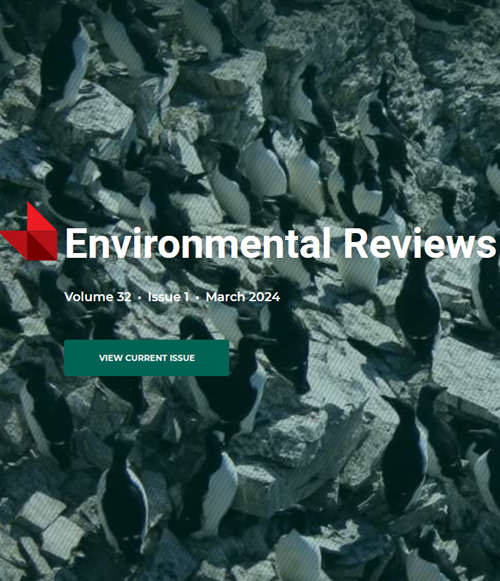和平-阿萨巴斯卡地区野牛(bison bison athabascae)污染物的评估
IF 5.1
3区 环境科学与生态学
Q2 ENVIRONMENTAL SCIENCES
引用次数: 0
摘要
由于污染物暴露和环境影响的风险,加拿大的石油生产活动一直存在争议。然而,尽管最近在监测方面取得了进展,但缺乏关于接触污染物及其对许多处于危险中的物种的相关影响的信息。主要位于阿尔伯塔省东北部的Peace-Athabasca地区的木野牛(bison bison athabascae)受到污染物的威胁尤其令人担忧,因为面临风险的野牛群规模较小,而且各种压力因素(包括污染物、疾病和气候变化)可能产生综合影响。在此,我们回顾了和平-阿萨巴斯卡地区关于木野牛污染物的现有文献,提取了研究目的、研究设计、地点、污染物和分析方法的信息。我们找到了六篇评估木野牛体内污染物的文章,结果表明,在油砂地区,木野牛暴露在多种化学污染物中。特别是,包括砷、镉、铅和无机汞在内的重金属,最常在野牛的肾脏、肝脏和肌肉组织中进行分析。我们还提供了木野牛和驼鹿(Alces Alces)重金属的类型和水平的比较。我们发现,关于木野牛的文章的年代相对于驼鹿(即,大多数是在20世纪90年代之前),而且对重金属和组织类型的评估较少。最后,我们讨论了在这些物种中选择重金属的知识差距以及对人类健康的已知影响。总体而言,我们的研究结果表明,需要更多的研究和监测,以了解对木野牛的威胁,相互作用和累积效应,以及与依赖木野牛作为传统食物来源的社区的人类健康和福祉相关的潜在问题。本文章由计算机程序翻译,如有差异,请以英文原文为准。
An assessment of contaminants in bison (Bison bison athabascae) in the Peace-Athabasca region
Oil production activities have remained contentious in Canada due to the risk of contaminant exposure and environmental impacts. However, despite recent advances in monitoring, there is a lack of information on contaminant exposure and its associated impacts for many species at risk. The threat from contaminants to wood bison ( Bison bison athabascae) in the Peace-Athabasca region, located principally in northeastern Alberta, is of particular concern, given the small size of the at-risk herds and the potential combined impacts of various stressors, including contaminants, disease, and climate change. Here, we review the available literature on contaminants in wood bison in the Peace-Athabasca region, extracting information on objectives, study design, location, contaminants, and analytic methods. We found six articles that assessed contaminants in wood bison and showed that, in the oil sands region, the species is exposed to a multitude of chemical contaminants. In particular, heavy metals, including arsenic, cadmium, lead, and inorganic mercury, were analyzed most often in bison kidney, liver, and muscle tissue. We also provide a comparison of the type and levels of heavy metals in wood bison and moose ( Alces alces). We found that articles on wood bison were dated relative to moose (i.e., mostly pre-1990s) and that fewer heavy metals and tissue types were assessed. Lastly, we discuss the gaps in knowledge on select heavy metals in these species and the known effects on human health. Overall, our results suggest that more research and monitoring are needed to understand the threats to wood bison, interacting and cumulative effects, and potential concerns related to human health and well-being for communities that rely on wood bison as a traditional food source.
求助全文
通过发布文献求助,成功后即可免费获取论文全文。
去求助
来源期刊

Environmental Reviews
环境科学-环境科学
自引率
3.50%
发文量
45
期刊介绍:
Published since 1993, Environmental Reviews is a quarterly journal that presents authoritative literature reviews on a wide range of environmental science and associated environmental studies topics, with emphasis on the effects on and response of both natural and manmade ecosystems to anthropogenic stress. The authorship and scope are international, with critical literature reviews submitted and invited on such topics as sustainability, water supply management, climate change, harvesting impacts, acid rain, pesticide use, lake acidification, air and marine pollution, oil and gas development, biological control, food chain biomagnification, rehabilitation of polluted aquatic systems, erosion, forestry, bio-indicators of environmental stress, conservation of biodiversity, and many other environmental issues.
 求助内容:
求助内容: 应助结果提醒方式:
应助结果提醒方式:


